Someone in a position of power at the New York Times seems to be against people working from home.
Two pieces published in consecutive weeks suggest working from home ain’t all that.
The first, “Working from Home Is Less Healthy Than You Think” is a good example of the classical rhetorical fallacy of begging the question by assuming a premise (working from home is healthy) is believed to be true.
Whenever I see a headline like this I want to ask, “Oh yeah, how do you know what I think?” What if I think working from home is a short route to a shallow grave already? Are you telling me it’s worse that that?
As it happens I don’t think that, but what if?
The bulk of the article is a sort of “on the one hand” vs. “on the other hand” about the relative potential to being sedentary at home versus the office, arguing that by not doing things like having to walk to lunch, or to go see what Barb in accounting is up to, you’re missing out on some important steps that add up to improved overall health.
The entire framing of the article is bizarre, as the more straightforward message is: Wherever you work, make sure to build in some physical activity every day, but that apparently wouldn’t satisfy whoever at the Times has a hate on for work-from-homers, so we get some silly B.S. about how commuting might actually be good for you.
Sure, those hours in a car in bumper-to-bumper traffic feeling your blood pressure rise toward boiling, or on public transit pressed up against a stranger hacking plague on the back of your neck are super good for your well-being.
Better get back to the office!
The other article by Steven Rattner, “Is Working from Home Really Working?” requires no contortions in terms of framing to make the anti-WFH point of view clear, as Rattner essentially argues that anyone working from home is not giving their employer full value for their employment.
Look, as someone who is self-employed and therefore has the freedom to work from wherever I please, I see work-from-home as a perk that allows me to live a healthier, more productive lifestyle, though it did take some experimenting for me to find a groove.
My solution, and I swear it works for me, is it basically work every day, but hopefully not too much every day, and rather than being wedded to the eight hours a day model ingrained in office culture, I have a task-based schedule where certain things have to get done by certain dates. Sometimes I work ahead, sometimes I fall behind, sometimes there’s a random Wednesday where I hardly do anything, or a Sunday where I find myself nose to the grindstone.
Whatever. I feel like I accomplish plenty, and have a mostly good time doing it. Autonomy and agency for the win!
I do not dispute that there are some aspects of work that are facilitated by employees being in proximity to each other, rather than working remotely, and it is reasonable for employers to create policies around those activities.
But let’s be clear about what’s going on in Rattner’s piece. This is the bosses not liking that their workers have grabbed a little freedom and agency for themselves and trying to rein that stuff back in without trying to look like that’s what they’re doing.
I see this as part of a larger general program being prosecuted by various parts of those who benefit from the maintenance of the status quo. Something similar is at work in the complaints about student “disengagement” that posit that increased grit must be the answer, rather than also examining whether or not what we ask students to do in school is worth being gritty about.
I see it in commentary about “long Covid,” where there already seems to be a push to minimize something we barely understand because disability is not something this country deals with well, often because it’s inconvenient to capital.
I see it in discussions about the economy and the Fed raising interest rates in order to cool inflation by putting people out of work. On that front, If you haven’t seen this exchange between Jon Stewart and Larry Summers, where Stewart presses Summers on just this point, I highly recommend it. Stewart essentially gets Summers to admit that the priority for the economy rests with capital over labor, and then Summers is a bit shocked when Stewart asks if it truly has to be this way?
Stewart is pressing Summers to articulate a set of values that he attaches to his policy prescriptions, and Summers is wrong-footed because he’s spent so many years assuming that his beliefs on policy are indistinguishable from the correct values.
The root value animating Rattner’s piece is, essentially, that your employer has majority ownership of your autonomy during the work day and they have a right to control employee autonomy as they see fit, including forcing you into an office.
Never mind the gross moral implications of such a view, it’s not even good management strategy if your goal is a happy and productive workforce. Study after study shows that the best work is done by the people who feel the most free and have the maximum possible autonomy inside their individual work domains. Social psychologist Fredrick Herzberg said it best, “If you want people to do a good job, give them a good job to do — an enriched job.”
Herzberg also said this, “Idleness, indifference and irresponsibility are healthy responses to absurd work.” My belief is that the pandemic was a bit of a stress test on this front, and lots of people started to see at least some portions of their jobs as “absurd” and have become less inclined to do them. Going into the office so that whatever they were doing was visible to their supervisors may be one of those absurd things.
Rattner wants to bring these people to heel.
Sometimes, if I start really thinking about the whole capitalist pay in exchange for labor and what we - okay, I - spend my time doing, I start to freak myself out about how weird this whole deal is. Whenever I travel I like to eavesdrop on the conversation of the people (mostly men) who are clearly doing business, and I wonder how this whole edifice doesn’t just crumble around us as we collectively question the value of this stuff we spend so much time doing.
I worry about this stuff and I like my work. Though maybe liking my work is what makes it easier to question the larger schema under which all this stuff is happening.
Perhaps there’s some understanding and insights to be found in books about work and working.
Whenever I think about books about work, I think about the late David Graeber’s Bullshit Jobs: A Theory. Jumping off from a survey in the UK that found that 37% of respondents answered “No” to the question, “Does your job make a meaningful contribution to the world?” Graeber explores the nature of jobs that seem pointless, where if the job stopped being done, nothing much would change.
Graeber put bullshit jobs into a taxonomy of five categories: “flunkies, goons, duct tapers, box tickers, and task masters.”
Bullshit jobs are not about status or importance. In fact, some of our obvious non-bullshit jobs like teaching and nursing are rather poorly compensated relative to their importance, while on the flipside there’s people making millions of dollars a year in bullshit jobs.
Consider for example some of the people who handle the investing for large endowments, managers that on average over time do no better and often worse than the Dow Jones Index but reap millions of dollars in compensation for their trouble.
Or how about huge swaths of the health insurance industry?
No shade to anyone working in those spaces - just about everyone’s gotta do something - but you start to wonder if that 37% is a little low.
I’ve been pretty fortunate to not have a lot of bullshit jobs in my life, though my first post-college gig as a paralegal on a large piece of corporate litigation where I mostly indexed and xeroxed documents for the purpose of greasing the wheels of the discovery phase felt pretty pointless, which is probably why I spent significant swaths of time writing short stories on legal pads while sitting at my desk.
This ultimately led me away from law school towards an MFA in creative writing and fast forward nearly thirty years, this newsletter where I air my nonsense on a weekly basis.
If that job hadn’t been bullshit, who knows what I would’ve been doing?
You can’t write about books about work without mentioning Studs Terkel’s monumental oral history, Working: People Talk about What They Do All Day and How They Feel about What They Do. Written in the voices of the workers themselves, it is the latter part of the subtitle that is the most interesting part for me, as the book unpeels the relationships we have with our work. Some people are happy, others are despairing, and in each entry there’s a little bit of wisdom about what it takes to put one foot in front of the other.
As a bonus, if you’re a writer of fiction or drama, Working is a great resource when it comes to seeing examples authentic first person voices. If you ever need a reminder about how people truly come alive through how they sound on the page, this is the book for you.
My politics were already pretty liberal by the time I first read Barbara Ehrenreich’s Nickel and Dimed: On (Not) Getting by in America, but the book had a huge role in what I now see as my ongoing radicalization around issues of labor in America. The book itself is just a very straightforward telling of Ehrenreich’s immersive experience trying to make it as a blue collar worker in America - working as a motel maid, waitressing in a diner - and the impossibility of achieving the kind of security that I (knock on wood) have had access to for the entirety of my life. Funny, unsparing, it’s Ehrenreich at her best.
( I wrote a tribute to Ehrenreich in my Chicago Tribune column after her passing last year.)
While there’s a good number of novels where the workplace is a background for the action, there’s not necessarily that many novels that are explicitly about “work,” or at least not that many that come to mind for me.
One that does jump to the top of my consciousness is Rona Jaffe’s classic The Best of Everything, recently reissued in honor of its 65th anniversary. The Best of Everything rotates among a quintet of women making their way in corporate America and New York City in the early “Mad Men” era.
It’s one of those books that will have you saying, “the more things change the more they stay the same.”
Joshua Ferris’s first novel Then We Came to the End is perhaps the novel that goes deepest on the culture and impact of what it means to work in an office of any book I’ve read. Told in the first person plural (“we”), the novel gets stranger and stranger the deeper it goes, becoming something of a page-turner by the end.
See also Ed Park’s Personal Days, which came out around the same time as Then We Came to the End and reads like an even darker, weirder companion novel.
I really don’t know how to describe The Regional Office Is Under Attack by Manuel Gonzales, but it involves a team of female assassins charged with protecting humanity who literally come under attack at the office from which they work. It’s a story about the intersection of superheroes and corporate bureaucracy.
See also Hench by Natalie Zina Walschots, about a young woman who works for a temp agency that provides laborers (aka henchmen and henchwomen) for super villains, and manages to get wrapped up in an ultimate battle between good and evil where it’s not necessarily clear who is good and who is evil.
Company by Max Barry uses the corporate setting as a kind of satire/horror combo, as Stephen enters the workplace eager to climb that ladder, but starts to wonder where those ladders might go. Barry is one of my most reliable favorites when it comes to delivering a book that will get me invested from the first page and engaged throughout.
The “slow horses” in Mick Heron’s Slow Horses are disgraced MI-5 agents consigned to Slough House, a crumbling office where they learn that hell really is other people, those other people being your co-workers. The slow horses are supposed to be confined to the stable, but Herron manages to bust them out into fast moving plots of high intrigue, book after book. If you haven’t checked out the AppleTV+ adaptation, that’s highly recommended as well.
Lastly, there’s a whole category of workplace novels that I haven’t touched on, the “campus” novel, of which there are many many examples, so many they will take another future newsletter to even begin to do them justice.
Of course, my experience with work books is limited to me. What are some of your favorite work-related reads?
Links
Normally I’m pretty resistant to nostalgia, but my Chicago Tribune column this week is on the passing of John Jakes purveyor of this historical melodramas (North and South) that once supplied just about the entirety of my historical knowledge got me thinking about what’s changed, mostly for the better.
If you’re as irritated as I am by Steven Rattner’s take on why people should be compelled back into the office, I recommend
and her regular feature, "Dingus of the Week," which this week featuers Rattner.Ahmir “Questlove” Thompson, drummer for The Roots and director of Oscar-winning documentary Summer of Soul is going to have his own publishing imprint. I think this is terrific news and will have more to say in a forthcoming column about it at the the Tribune.
Hundreds of ChatGPT created books have already started to appear on Amazon. The flood of AI-generated crap is going to get worse before it gets better. If you teach writing or want a little solace from the AI hype, check out my course on “Teaching Writing in an AI World.” I know we can survive this if we keep our heads.
It is a general truism that the book version is better than the movie, which is why this list by Emily Temple of 13 films that are better than their book source material is so interesting.
For those who are interested in some of the inside story of the ups and downs of the writing life, I recommend becoming an early subscriber to
by Christine Sneed, and especially recommend her post on what it's like to go eight years between publishing books, even as you're writing a book every year or so. Keeping with this week’s theme, Christine’s newest book is an office comedy, Please be Advised.Recommendations
All books linked in this newsletter are part of The Biblioracle Recommends bookshop at Bookshop.org. Affiliate income for purchases through the bookshop goes to Open Books in Chicago and another book-related charity still to be named.
Affiliate income is $84.00 for the year.
1. A Fatal Grace by Louise Penny
2. Beautiful World, Where Are You by Sally Rooney
3. The Man Who Died Twice by Richard Osman
4. The Italian Teacher by Tom Rachman
5. The Cabinet by Un-Su Kim (translated by Sean Lin Halbert)
Arleen P. - Morton Grove, IL
Going on a bit of a limb here because this is a weird book, but for the people who connect with it, it becomes a bit of a favorite. For the rest, it’s a head scratcher, but maybe not in a bad way, Hard-Boiled Wonderland and the End of the World by Haruki Murakami.
Presuming you live in the Northern Hemisphere, I hope it’s feeling like Spring wherever you live.
Don’t forget to tell me and the other readers your favorite books about work!
Take care,
John
The Biblioracle




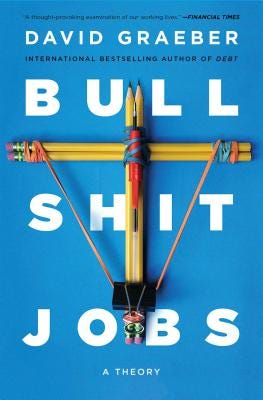
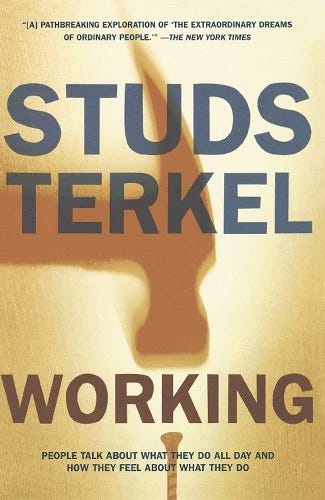


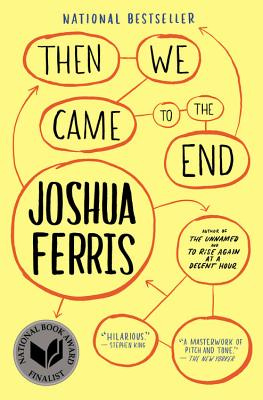

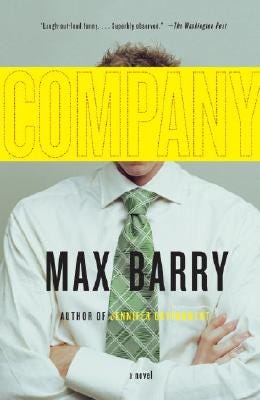
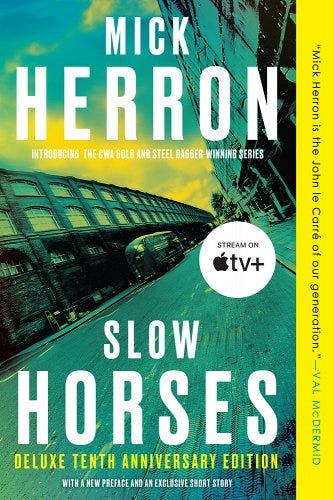
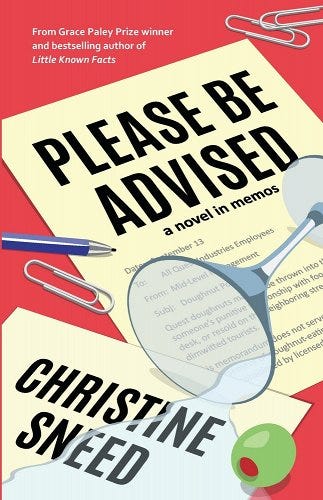
I'm paywalled out of the Tribune piece on John Jakes but amused that just this very morning I was reminiscing with my sister-in-law over coffee about one family vacation to cabins at Moosehead Lake in Maine when I was about 11 and was allowed to stay back at the cabin while everyone else hiked, and I stayed the whole day in the loft reading North and South and eating gingersnap cookies...one of my favorite childhood memories :D
Then We Came to the End is one of my favorite books, but I always have a hard time describing it to friends I’m trying to persuade to read it. Thanks for including it in your list.